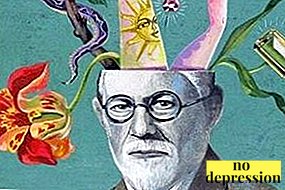“Freudian Disclaimer” is a widely used expression that is often tried to be used for any random substitution of words in the interlocutor's speech.
What is a Freudian reservation? Does it hidden meaning every wrongly used word?
Freudian clause - what is it?

If the famous Austrian psychiatrist Sigmund Freud needs no introduction, then the phenomenon parapraxis (the term scientifically denotes reservations), described by him in the work Psychopathology of Everyday Life in 1901, still needs more detailed consideration.
Freud suggested that a different kind erroneous, meaningless actions in fact, they carry in themselves a hidden background, being the general result of the work of consciousness and unconscious desire.
The psychiatrist believed that in this way manifest themselves unconscious conflicts.
Under the term parapraxis implies the following actions:
- occasional reservations, clerical errors, misdeeds and misread words;
- forgetting of words, names, names, expressions, impressions;
- the loss of things or their concealment, after which the person himself cannot find them;
- erroneous meaningless actions.
The fact is that many actions - for example, speech, writing, gestures, walking - in the process of learning as a child they are consciously performed by a child, but then they are forced into the unconscious.
Thus, we on automation, without thinking, can perform a number of actions, which will be link with the unconsciousmanifested in the casual use of inappropriate movements or words.

At the same time, speaking of Freud, in particular, means some accidentally dropped word that does not fit into the context of a man’s speech, but expressing his true unconscious intentions.
In the same sense, the psychiatrist considered incorrectly heard or read words, forgetting things - for example, a wallet or a folder with documents, as well as random gestures that did not correlate with speech.
Examples
The best example of a Freudian reservation is the case described by the psychiatrist himself. One day, he was driving with a stranger in a carriage to Herzegovina, leading a casual conversation with him.
First she walked about the customs of the Turks living in Bosnia and Herzegovina - in particular, about their attitude towards doctors.
They dutifully give their fate into the hands of the doctor who is treating them, and even if the doctor cannot help the patient with anything, he will not meet any accusations from the patient or his relatives.
Traditionally, the Turks say in this case: "I know that if you had the opportunity, you would have saved the patient."
Then conversation smoothly flowed to the topic of art - moreover, Freud could not recall the name of one master, famous for the frescoes painted by him in Italy in Orvietto.

The names of Boltraffio and Botticelli come to mind to the psychiatrist, although he himself understands that he knows nothing about the first one.
Over time, he manages to remember the name of the artist - Signorelli, however two randomly mentioned names on "Bo-" make Freud think.
The psychiatrist recalled that, in a conversation with a stranger, he refrained from mentioning yet another feature of the Bosnian Turks - they extremely appreciate sexual pleasure.
Moreover, in cases involving sexual dysfunction, sexual dysfunction, they simply fall into despair. One colleague reported to Freud the following dictum of the patient: “If not, then life itself has no value.”
The psychiatrist himself recalled that in a town called Trafoi, where he was staying a few weeks ago, he learned that his patient, suffering from an incurable sexual disorder, had died.
Then same psychiatrist it became clear why the names Botticelli and Boltraffio suddenly appeared in the mind. Both of them begin on “Bo-” - just like Bosnia, to which its inhabitants, who value sex, have relations.
Also, the name Boltraffio is consonant with the name of the town by Trafoi, in which the psychiatrist learned the news that was unpleasant for him.

In this example, you can see how classical reservation - the name of Boltraffio, and the repression, forgetting the real name of Signorelli - as an unpleasant memory of a patient who committed suicide.
As you can see, to trace the associative link between the mention of the name and the repressed unpleasant memory is not so easy in this case, but there are more simple examples in which hidden intentions are easier to guess.
Freud himself mentions the following case - one man who talked to a woman wearing a dress with a plunging neckline asked her: “Have you seen today's exhibition at the Vartheim? It is beautifully decolted. ”
Instead of the word “decorated”, the man breaks through a derivative of the conscious question of the exhibition and his desire to admire the companion’s neckline.
Freud reservations do not always relate to sex in one form or another. There are many statements by politicians who also make you think about their hidden desires.
For example, Zyuganov once said on behalf of his party the Communist Party: “We are supported by several million rubles,” meaning, of course, “people,” but by making a rather unambiguous reservation.
How to recognize?

However, despite the seeming simplicity and sometimes literal understanding of the hidden meanings of words, recognize the Freudian reservation in its true meaning, when it indicates intrapersonal conflicts or repressed painful memoryis not so easy.
Often, a person simply produces several thought processes simultaneously, with the result that substitution of words.
For example, if a young man makes a reservation about intima in the context of a general conversation that is far from this, this does not at all mean that he has problems in the sexual sphere - perhaps a sexy girl who had distracted his attention just passed by.
One of the clearest signs that reservations are truly true, that they speak of deep-seated experiences, is their stability over time.
For example, a person can constantly negotiate the same word, talking on various topics.
And even in this case, one cannot literally understand the meaning of the word not being used - because for different people the same words can carry different semantic meaning, consist in different associative chains.

However, only a detailed analysis of the situation and associations with the proviso can reveal their connection with key experienceshaving an effect on a person’s behavior, indicating problems in his psychological state.
Often, reservations define only momentary psychological state a man - for example, if a man confused female names, this does not mean that the wife should think that he spends the night thinking about the mentioned woman or that he does not realize that he is in love with her.
Probably, he was just pestered at work by some careless employee who often had to be contacted by name, but this had nothing to do with serious feelings.
Modern psychologists have different reservations.how to diagnostic material.
Someone remains faithful to the traditional psychoanalytic theory, accepting them as important pointers when searching for psychological problems of a person, some reject their significance, saying that these methods are outdated for a long time.
For an ordinary person, the most main indicator of the severity of the reservation there may be feelings that have arisen with the admitted substitution of words. If, with a reservation, the emotional background changes sufficiently, we can say that this nuance should be considered in more detail.
If it just looks funny, does not leave any unpleasant aftertaste, you can simply ignore it.
Freudian reservation - what does this mean? Subtleties of psychology:



